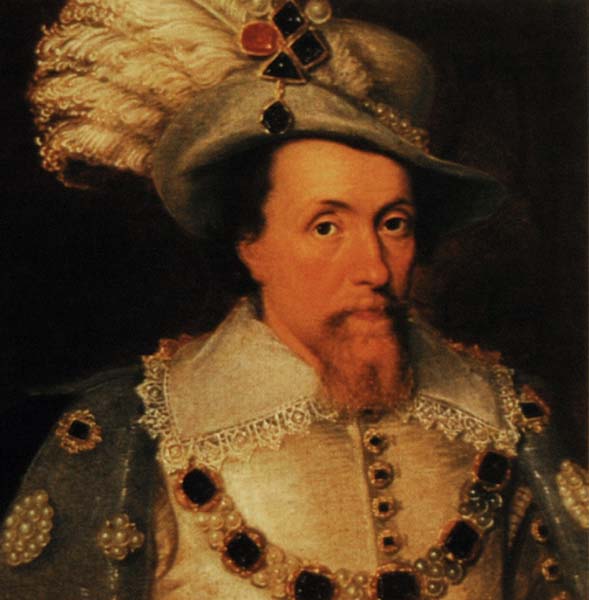-
Sylvhia.
User deleted
Rise and Decline Of Archibald Armstrong the Court Jester of King James VI

Archibald Armstrong (died March 1672), court jester, called "Archy," was a native of Scotland or of Cumberland, and according to tradition first distinguished himself as a sheep-stealer; afterwards he entered the service of James VI, with whom he became a favourite.
When the king succeeded to the English throne, Archy was appointed court jester. In 1611 he was granted a pension of two shillings a day, and in 1617 he accompanied James on his visit to Scotland. His influence was considerable and he was greatly courted and flattered, but his success appears to have turned his head. He became presumptuous, insolent, and mischievous and was much disliked by the members of the court. James seems to have favoured him, indeed in August 1618 Archie got the monopoly on tobacco pipes. James VI
James VI
In 1623 he accompanied Prince Charles and Buckingham in their incognito travel into Spain,to try to reach agreement on the long-pending Spanish match, and there he was much caressed and favoured by the Spanish court and, according to his own account, was granted a pension. His conduct here became more intolerable than ever. In a letter to James I, dated 28 April 1623, he wrote that the King of Spain received him in audience when neither 'men of your own nor your son's men can come nere of him' .h He was often invited to amuse the Infanta in her private chamber, and one day twitted her with the defeat of the Armada. To his English companions he made himself repeatedly obnoxious. Sir Tobie Matthew, one of Prince Charles's attendants, unable to endure his blunt taunts, quarrelled openly with him one day at a public dinner, and before the embassy left Madrid he came to very high words with Buckingham. He 'dared to speak his opinion to the duke,' says Fray Francisco, the author of 'the Narrative of the Spanish Marriage' , 'with all the force of truth, blaming severely the manner in which the whole negotiation had been carried on without consistency or truthfulness.' Buckingham, unable to silence Armstrong, threatened to have him hanged, and 'the fool replied in a way worthy of one of better sense: "No one has ever heard of a fool being threatened for talking, but many dukes have been beheaded for their insolence."' On his return to England, Armstrong's continued attacks upon the Spanish match and upon Buckingham rendered him highly popular. (William Laud)
(William Laud)
He retained his post on the accession of Charles I, and accumulated a considerable fortune, including the grant by the king of 1000 acres (4 km²) in Ireland. After the death of Buckingham in 1628, whom he declared "the greatest enemy of three kings," the principal object of his dislike and rude jests was William Laud(English churchman and academic, Archbishop of Canterbury from 1633, during the personal rule of Charles I. Arrested in 1640, he was executed in 1645), whom he openly vilified and ridiculed.
But Armstrong's fall was not far distant. With Archbishop Laud he was, as with Buckingham, never on good terms. The fool openly ridiculed his religious and political principles, and a quarrel between them lingered on for many years. On one occasion Armstrong, having obtained permission to say grace at Whitehall in Laud's presence, blurted out 'Great praise be given to God, and little laud to the devil.' The archbishop was at first unable to obtain any redress; his enemies rallied round Armstrong, and the fool continued with impunity to 'belch in his face such miscarriages as he was really guilty of.' But on the Marquis of Hamilton's return from Scotland in 1637 bringing the news of the rebellion at Stirling in opposition to Laud's new liturgy, the fool, after many expressions of disapproval of the Scotch policy, went a step too far. Meeting the archbishop as he was entering the council chamber at Whitehall( the main residence of the English monarchs in London from 1530 until 1698) , he shouted out, 'Whoe's fool now? Does not your grace hear the news from Striveling?' Laud at once brought the matter before the council, at which the king and many noblemen were present, and Armstrong was condemned 'to have his coat pulled over his head and be discharged the king's service and banished the king's court.' Armstrong pleaded in vain the privilege of his office; the order was summarily executed, and the post of court-jester was immediately filled up. According to some accounts Laud endeavoured to bring the fool before the Star Chamber(an English court of law who sat at the royal Palace of Westminster), and the mediation of the queen alone prevented the success of this attempt.
During his later years he settled in London as a money-lender, and many complaints were made to the privy council and House of Lords of his sharp practices. In 1641 on the occasion of Laud's arrest, he enjoyed a mean revenge by publishing Archy's Dream; sometimes Jester to his Majestie, but exiled the Court by Canterburie's malice. Subsequently he resided at Arthuret in Cumberland, according to some accounts his birthplace, where he possessed an estate, and where he died in 1672, his burial taking place on April 1.
"William Laud" by after Sir Anthony Van Dyck - http://www.npg.org.uk/collections/search/portrait/mw03781. Licensed under Public Domain via Wikimedia Commons.
He was twice married, his second wife being Sybilla Bell. There is no record of any legal offspring, but the baptism of a "base son" of Archibald Armstrong is entered in the parish register of December 17, 1643.
http://en.wikipedia.org/wiki/Archibald_Armstrong
http://en.wikisource.org/wiki/Armstrong,_A...ald_%28DNB00%29.
Rise and Decline Of Archibald Armstrong the Court Jester of King James VI |


